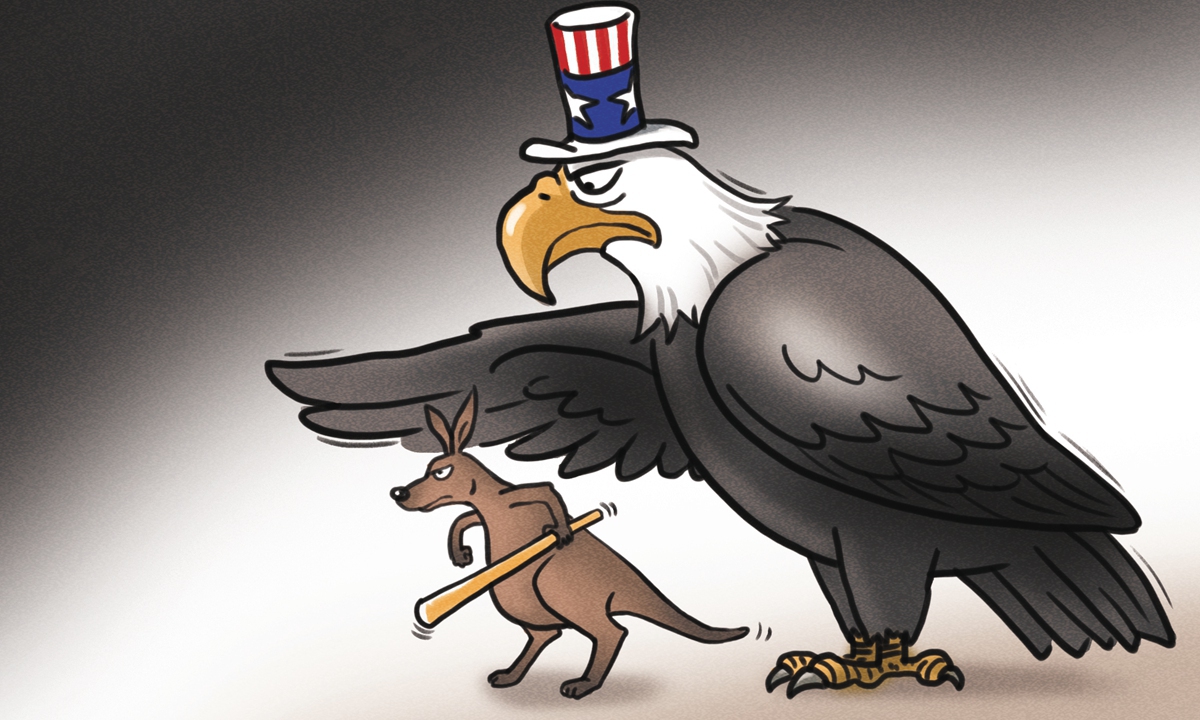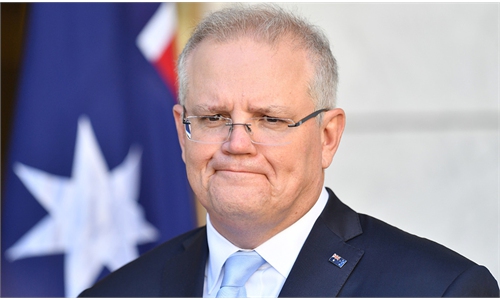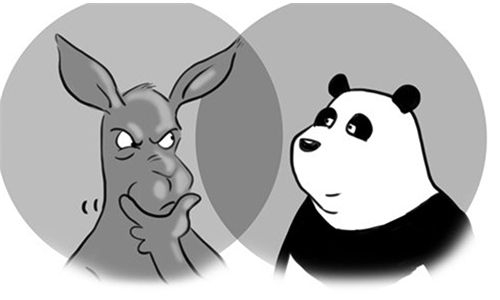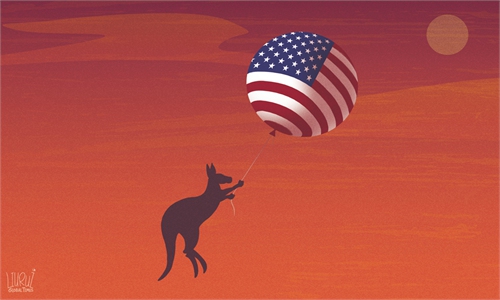
Australia, US Illustration: Liu Rui/Global Times
The Lowy Institute, a Sydney-based think tank, released this year's Asia Power Index on Sunday. Created in 2018, the Index ranks the relative power of 26 states in Asia by measuring their resources and influence. It is reported that the Index considers "a wide range of measures," including economic and military capabilities, economic relations, and defense networks, as well as diplomatic and cultural influence.The result of this year's report claims that the US continues to be the most powerful country in Asia, gaining 0.6 points more than in 2020 - the biggest gain among all 26 countries in 2021. What is even more beguiling is that the scores of both large and medium-sized countries have declined except for the US. China, nonetheless, while still in second place for the fourth consecutive year, saw a drop of its score for the first time since 2018.
However, this is to a large extent at odds with the actual situation. Over the previous year the world has been witnessing a series of problems and debacles in the US as a direct result of mismanagements and malpractices by recent US administrations. As a matter of fact, Washington has not been able to maintain its erstwhile leading status in terms of influence. In fact, the majority of think tanks and organizations around the globe agree that the US is in general decline, as opposed to what the Lowy Institute has concluded.
At the same time, China has undeniably shown increasing dynamism in recent years, in spite of persistent attempts of suppression from the US and its allies. China has unremittingly been able to maintain a vibrant momentum in many aspects, in particular politically, economically, and culturally.
The Lowy Institute's assessment about China and the US has obviously been influenced by the habitual pivot to the US by many Western, in this case Australian academics and analysts, who have been consciously or subconsciously under the sway of the US ideological hegemony. Some Australian think tanks along with their scholars have unfortunately been trapped in a US-dominated mindset, which precludes any different perception and assessment of the world, in particular when the US and China come into their perspective. The objectivity of their research, more often than not, falls prey to prevailing stereotypes. We have reason to suspect that the Asia Power Index has regretfully been compelled to conform to political correctness in the US-dominated West - to follow Washington's lead to talk down to China.
In terms of the perception of China, the West has been overemphasizing ideological divisions in the world, with a purported target to isolate and suppress China. Some Western think tanks have espoused tendentious research criteria and dubious measures resulting in the ideological biases which has tinted the objectivity of some reputable think tanks.
The US policy and strategy have cast a dogged impact on Australia's international outlook and its own policies. Australia has unfailingly adopted indiscriminate support to most of the US' foreign policies. One most recent instance is that in the anti-China campaign launched by the Biden administration, Australia has acted fervently as a pioneer, blindly forging ahead to serve Washington's interest and targets.
The current Morrison government has closely attached itself to the US' strategic agenda; according to the Canberra politicians' logic, if the US fails to maintain its regional and global hegemony, Australia would lose its shadowing position as Washington's "deputy sheriff". Therefore, Australia has been convinced to support the US to retain and maintain its traditional supremacy in the Asia Pacific and elsewhere in the world. It overstates and inflates the role and influence of the US in many respects, such as this year's Asia Power Index which has calculatedly pumped up the significance of the US.
It is also noteworthy that Australia caters to the strategic goals of the US at the expense of its own national interests. In a number of issues concerning China, Australia has categorically acted in the most assertive way to provoke conflicts and confrontations with its biggest economic partner, which has undermined Australia's own national interests. Instead of having a clear understanding of its own problems in today's geopolitical reality, Australia has become a political instrument of the US.
Canberra's words and deeds, especially with regard to China, have been disappointingly going against common sense. It is plain to any eye that there is a want of independence in Australia's diplomatic outlook and policy. Some judicious Australian political figures have recently sharply criticized the Morrison administration's lopsided tilt toward the US, arguing for a mature policy to deal with China. But such words of wisdom appear to have fallen into deaf ears of some Canberra politicians, who obstinately refuse to give up their obsession to challenge and antagonize China.
The author is president of the Chinese Association of Australian Studies, and professor and director of Australian Studies Centre, East China Normal University. opinion@globaltimes.com.cn



